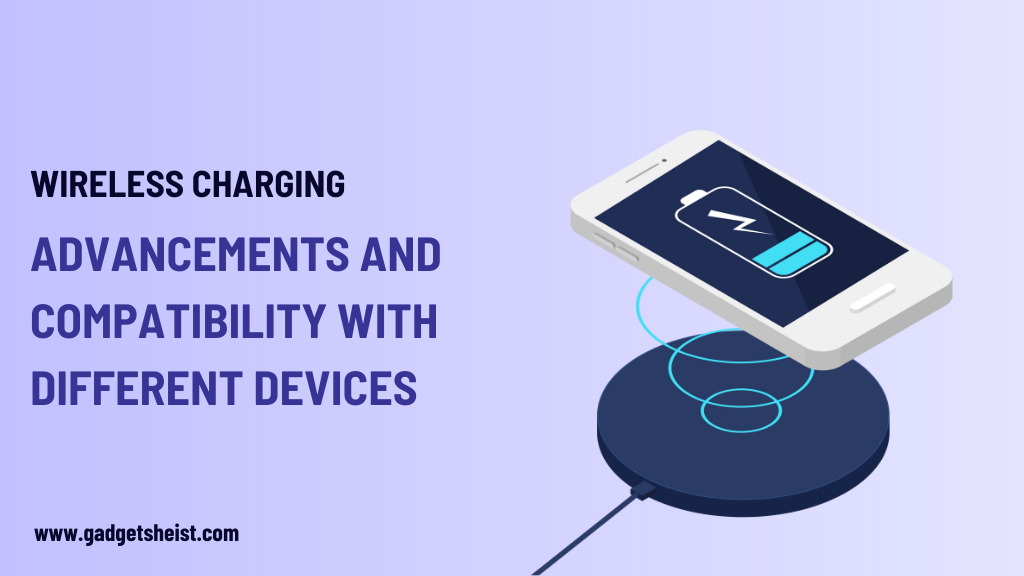Introduction
Wireless charging has revolutionized how we power our devices, providing a convenient, cable-free solution. Over the years, this technology has undergone significant advancements, making it more efficient and compatible with a wide range of devices. In this blog post, we will explore the advancements in wireless charging technology and discuss its compatibility with different devices.
Advancements in Wireless Charging Technology
Increased Power Efficiency
One of the significant advancements in wireless charging is improved power efficiency. Previously, wireless chargers were known to be less efficient compared to traditional wired chargers. However, with new standards like Qi (pronounced “chee”), wireless charging has become much more efficient, reducing energy wastage and charging times.
Faster Charging Speeds
Another notable advancement is the increase in charging speeds. Early wireless chargers were relatively slow compared to wired chargers. However, with technological advancements, wireless chargers now support higher power outputs, allowing faster charging. For instance, compatible fast wireless chargers can charge some modern smartphones from 0 to 50% battery capacity in 30 minutes.
Extended Range
Wireless charging requires proximity between the device and charger. However, recent advancements have expanded the charging range. Companies are now developing technologies that enable charging at a distance, eliminating the need for direct contact. This opens up possibilities for charging multiple devices simultaneously and charging devices while on the move.
Compatibility with Different Devices
Smartphones:
Wireless charging is widely supported by many smartphone manufacturers. Most flagship smartphones, including iPhone, Samsung Galaxy, and Google Pixel, have built-in wireless charging capabilities. Additionally, many mid-range and budget-friendly smartphones also feature wireless charging support. Not all smartphones use the same wireless charging standard; therefore, it is crucial to ensure compatibility between the device and charger.
Wearable Devices:
Wireless charging has also made its way into wearable devices such as smartwatches and fitness trackers. Companies like Apple, Samsung, and Fitbit offer wireless charging options for their wearable products, providing convenience for users who want to avoid cables.
True Wireless Earbuds
The popularity of true wireless earbuds has surged in recent years, and many of these devices support wireless charging. Brands like Apple, Samsung, and Jabra offer wireless charging cases for their earbuds, allowing users to charge them effortlessly by placing them on a compatible wireless charger.
Electric Vehicles
Wireless charging is not limited to small portable devices; it is also being developed for electric vehicles (EVs). This technology allows EV owners to charge vehicles without needing physical connectors or plugs. The vehicle’s battery can be charged through electromagnetic induction by parking an EV over a wireless charging pad.
5 Features to Consider Before Buying a Wireless Charger
Charging Standards
It is crucial to check the charging standards supported by the wireless charger. The most widely adopted standard is Qi (pronounced “chee”), which ensures compatibility with various devices. Qi-certified chargers are compatible with smartphones, smartwatches, and other wireless charging devices. Checking for Qi certification guarantees that the charger meets industry standards and will work seamlessly with your devices.
Power Output
The power output of a wireless charger determines how quickly your device will charge. Different chargers offer varying power outputs, typically measured in watts. Higher power outputs generally result in faster charging speeds. For instance, a 10-watt charger will charge your device faster than a 5-watt charger. If you have a device that supports fast charging, ensure that the wireless charger can deliver the required power output for optimal charging speed.
Charging Modes
Wireless chargers may offer different charging modes, such as standard and fast charging. Standard charging mode provides a consistent charging speed, while fast charging mode delivers a higher power output for faster charging. Some chargers even offer multiple charging modes to cater to different devices’ requirements. Consider your device’s compatibility and charging needs to choose a wireless charger with appropriate charging modes.
Design and Form Factor
A wireless charger’s design and form factor play a significant role in its usability and convenience. Look for a charger with a non-slip surface or grips to ensure your device stays securely in place during charging. Some chargers also feature built-in stands or pads that allow you to prop up your device, making it easier to use while charging. Additionally, consider the size and portability of the charger if you plan to carry it with you on the go.
Additional Features
Beyond the basic charging functionality, some wireless chargers offer additional features to enhance your charging experience. For example, specific chargers include built-in cooling fans to prevent overheating, which can be beneficial for devices that get hot while charging wirelessly. Some chargers also have LED indicators or intelligent features like automatic power off once fully charged. Evaluate these additional features to determine if they align with your preferences and usage requirements.
FAQ
Do all wireless chargers work with all devices?
No, not all wireless chargers work with all devices. Compatibility varies depending on the charging standards supported by the charger and the device you want to charge. It is essential to ensure that your device supports wireless charging and that the charger is compatible with your device’s specific charging standard.
What are wireless chargers compatible with?
Wireless chargers are primarily compatible with smartphones, including popular brands like iPhone, Samsung Galaxy, Google Pixel, and others that support wireless charging. They are also compatible with specific wearable devices, such as smartwatches, fitness trackers, and true wireless earbuds with wireless charging cases. Some wireless chargers are even designed for use with electric vehicles.
How is a wireless charger compatible with my phone?
To determine if a wireless charger is compatible with your phone, you need to check if it supports wireless charging and uses a compatible charging standard. Most smartphones that support wireless charging use the Qi standard. Look for any Qi certification logos or references in your phone’s specifications. If your phone supports Qi wireless charging, it should work with any wireless charger supporting the Qi standard.
Do wireless chargers work with old phones?
Whether or not wireless chargers work with older phones depends on the phone’s hardware capabilities and software compatibility. Wireless charging requires specific hardware components, so if an older phone lacks those components, it won’t be able to utilize wireless charging. Additionally, wireless charging compatibility may also depend on the software updates the phone manufacturer provides. You should check your phone’s specifications and consult the manufacturer to determine if it supports wireless charging.
Conclusion
Thanks to continuous technological advancements, wireless charging has come a long way since its inception. With improved power efficiency, faster charging speeds, and extended charging ranges, wireless charging has become a viable option for various devices. From smartphones and wearables to true wireless earbuds and electric vehicles, wireless charging offers a convenient and cable-free solution for powering our devices. As this technology continues to evolve, we can expect even more compatibility and innovation in wireless charging.








